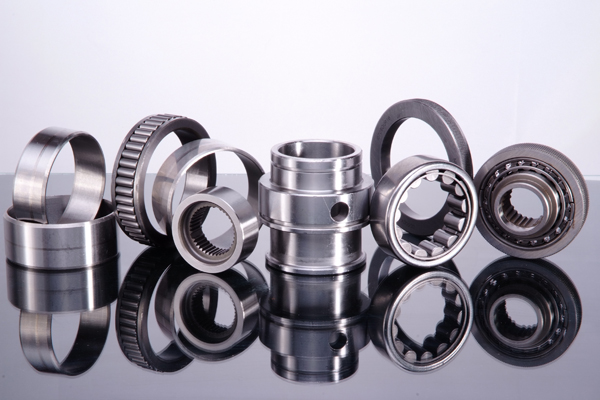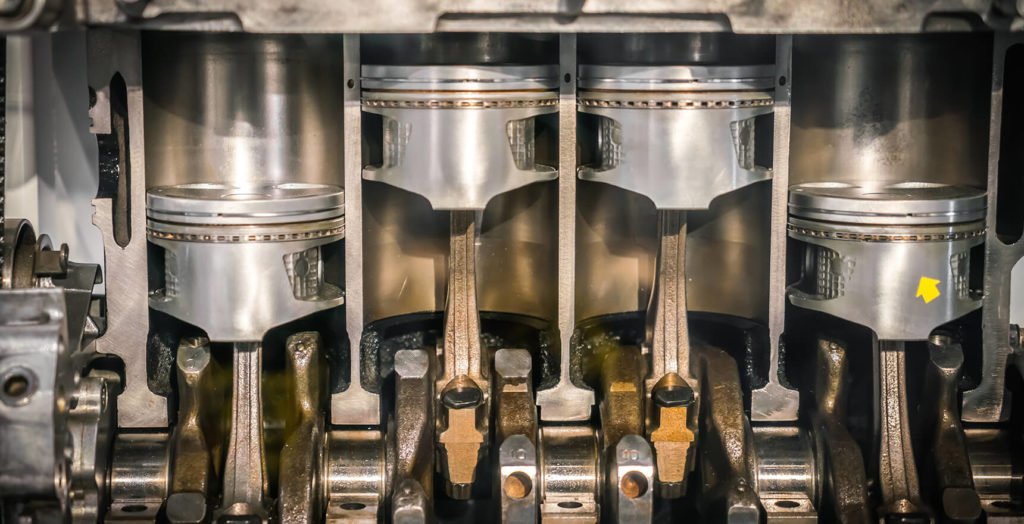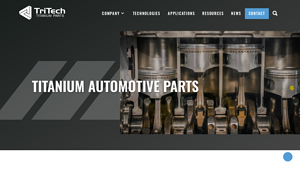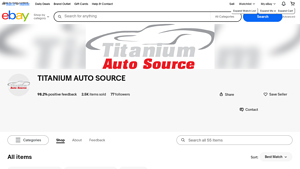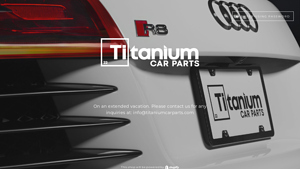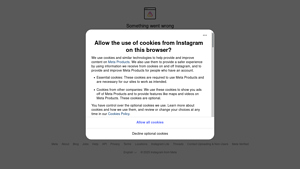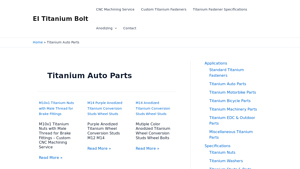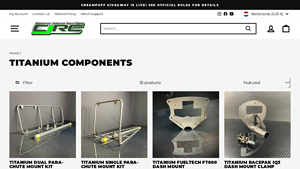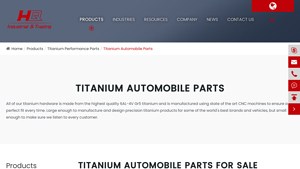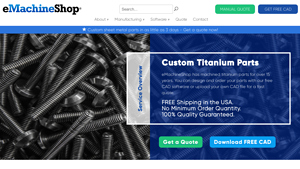Introduction: Navigating the Global Market for titanium auto parts
In the rapidly evolving automotive industry, sourcing titanium auto parts presents a unique challenge for international B2B buyers. With its exceptional strength-to-weight ratio, titanium is increasingly recognized for its ability to enhance vehicle performance while optimizing fuel efficiency. However, navigating the complexities of the global titanium market can be daunting, particularly for buyers in diverse regions such as Africa, South America, the Middle East, and Europe. This guide aims to demystify the landscape of titanium auto parts by providing a comprehensive overview of the various types of components available, their applications, and critical factors to consider when sourcing.
Within this guide, readers will find detailed insights into the manufacturing processes, such as 3D printing, investment casting, and metal injection molding, which can significantly influence product quality and cost. Additionally, we will discuss effective strategies for vetting suppliers, ensuring that buyers can identify reliable partners who meet their specific needs. By empowering B2B decision-makers with actionable insights on pricing, production timelines, and quality assurance, this resource serves as a vital tool for informed purchasing decisions. Whether you are in Vietnam or Brazil, understanding the intricacies of titanium auto parts will enable you to capitalize on the advantages of this advanced material in your automotive applications.
Understanding titanium auto parts Types and Variations
| Type Name | Key Distinguishing Features | Primary B2B Applications | Brief Pros & Cons for Buyers |
|---|---|---|---|
| Connecting Rods | Lightweight, high strength, and fatigue resistance | High-performance engines, racing cars | Pros: Reduces weight, enhances performance. Cons: Higher cost compared to steel. |
| Valves | Corrosion-resistant and high-temperature durability | Automotive engines, exhaust systems | Pros: Longer lifespan, improved efficiency. Cons: Requires precise manufacturing processes. |
| Crankshafts | Excellent strength-to-weight ratio | Sports cars, luxury vehicles | Pros: Enhances engine performance and fuel efficiency. Cons: Complex manufacturing can increase lead time. |
| Wheels | Lightweight and strong, often with aesthetic designs | Custom automotive builds, racing | Pros: Improves handling and reduces unsprung weight. Cons: Premium pricing may deter budget-conscious buyers. |
| Turbocharger Components | High resistance to heat and pressure | Performance tuning, motorsport | Pros: Increases engine efficiency and power output. Cons: Specialized manufacturing may limit availability. |
What Are the Key Characteristics of Titanium Connecting Rods?
Titanium connecting rods are renowned for their lightweight yet robust design, making them ideal for high-performance and racing applications. Their ability to withstand significant stress while reducing reciprocating mass contributes to enhanced engine responsiveness and efficiency. When considering B2B purchases, buyers should focus on the manufacturer’s expertise in producing these components, as precision in design and manufacturing is crucial to performance and reliability. Additionally, evaluating the cost versus performance benefits will be essential for making informed decisions.
How Do Titanium Valves Enhance Engine Performance?
Titanium valves are characterized by their exceptional resistance to corrosion and high temperatures, making them suitable for demanding automotive environments. These valves help improve airflow and engine efficiency, leading to better performance and fuel economy. For B2B buyers, it is vital to assess the supplier’s capabilities in maintaining strict quality control and ensuring compatibility with existing engine designs. Furthermore, understanding the long-term cost savings associated with durability and performance can justify the initial investment.
What Advantages Do Titanium Crankshafts Offer in Automotive Applications?
Titanium crankshafts are distinguished by their superior strength-to-weight ratio, which allows for increased engine performance while minimizing overall weight. This is particularly beneficial in sports cars and high-end vehicles where every ounce counts. Buyers should prioritize manufacturers with advanced technology and expertise in titanium forging or machining, as the complexity of crankshaft design requires precision engineering. Additionally, buyers should consider lead times and the potential need for custom designs based on specific performance goals.
Why Choose Titanium Wheels for Automotive Applications?
Titanium wheels are not only lightweight but also offer unique aesthetic qualities, making them a popular choice for custom automotive builds and racing applications. Their strength contributes to better handling and performance by reducing unsprung weight. B2B buyers should consider the balance between cost and performance when selecting titanium wheels, as they often come at a premium price. Evaluating the supplier’s production capabilities and customization options can also enhance the buying decision.
What Makes Titanium Turbocharger Components Essential for High-Performance Engines?
Turbocharger components made from titanium exhibit high resistance to heat and pressure, essential for maximizing engine efficiency and power output. These components are typically used in performance tuning and motorsport applications, where reliability and performance are paramount. When purchasing, B2B buyers should assess the manufacturer’s experience with turbocharger technology and materials. Understanding the specific performance requirements and compatibility with existing systems is crucial for ensuring optimal performance.
Key Industrial Applications of titanium auto parts
| Industry/Sector | Specific Application of Titanium Auto Parts | Value/Benefit for the Business | Key Sourcing Considerations for this Application |
|---|---|---|---|
| Automotive Racing | Titanium connecting rods | Enhanced performance through reduced weight, leading to improved speed and fuel efficiency. | Look for suppliers with expertise in high-stress applications and fast turnaround times. |
| Commercial Vehicles | Titanium exhaust systems | Lightweight yet durable components that reduce weight and improve fuel efficiency. | Ensure compliance with international emissions standards and focus on corrosion resistance. |
| Electric Vehicles | Titanium battery housings | Lightweight materials that enhance battery performance and longevity. | Prioritize manufacturers who specialize in custom designs to meet specific voltage and thermal requirements. |
| Aftermarket Performance | Titanium valve covers and fasteners | Customization options enhance aesthetic appeal while providing weight savings and durability. | Seek suppliers with a strong reputation for quality and customization capabilities. |
| Aerospace | Titanium engine components | Superior strength-to-weight ratio improves overall aircraft efficiency and performance. | Verify certifications and quality assurance processes to meet stringent aerospace standards. |
How Are Titanium Auto Parts Used in Automotive Racing?
In the automotive racing sector, titanium connecting rods are a critical application. These parts contribute to a significant reduction in reciprocating mass, enabling engines to rev higher and respond quicker. This results in improved speed and fuel efficiency, essential for competitive racing. B2B buyers in this industry should seek suppliers that specialize in high-stress applications and can provide rapid production capabilities to meet the demanding timelines of race teams.
What Role Do Titanium Exhaust Systems Play in Commercial Vehicles?
Titanium exhaust systems are increasingly utilized in commercial vehicles due to their lightweight yet robust nature. These systems help reduce the overall weight of the vehicle, leading to enhanced fuel efficiency and lower operational costs. Buyers should consider manufacturers that ensure compliance with international emissions regulations and offer components with superior corrosion resistance, which is crucial for vehicles operating in diverse environmental conditions.
Why Are Titanium Battery Housings Important for Electric Vehicles?
In the electric vehicle sector, titanium battery housings are gaining popularity for their lightweight properties, which contribute to improved battery performance and longevity. The reduced weight allows for more efficient energy usage, enhancing the vehicle’s range. International buyers should prioritize manufacturers experienced in custom designs to meet specific voltage and thermal requirements, ensuring that the battery systems perform optimally under various conditions.
How Do Aftermarket Performance Parts Benefit from Titanium?
Titanium valve covers and fasteners are popular in the aftermarket performance sector. These components not only provide significant weight savings but also enhance the aesthetic appeal of vehicles, allowing for customization that attracts enthusiasts. When sourcing these parts, businesses should look for suppliers with a strong reputation for quality and the ability to offer bespoke solutions that cater to specific customer preferences.
What Are the Advantages of Titanium Engine Components in Aerospace?
In the aerospace industry, titanium engine components are essential due to their superior strength-to-weight ratio, which significantly improves aircraft efficiency and performance. These parts help reduce fuel consumption and increase payload capacity, crucial for airlines and manufacturers. B2B buyers must verify that suppliers have the necessary certifications and quality assurance processes in place to meet the stringent standards of the aerospace sector, ensuring safety and reliability.
3 Common User Pain Points for ‘titanium auto parts’ & Their Solutions
Scenario 1: Difficulty in Specifying the Right Titanium Alloy for Automotive Applications
The Problem: B2B buyers often face challenges in selecting the appropriate titanium alloy for their specific automotive applications. Titanium alloys vary significantly in terms of mechanical properties, corrosion resistance, and cost, leading to potential performance issues if the wrong alloy is chosen. This can result in increased production costs, delays in manufacturing, and ultimately unsatisfactory product performance, which can affect customer satisfaction and brand reputation.
The Solution: To overcome this challenge, buyers should engage in a collaborative design process with their titanium parts manufacturer early in the project. It is essential to clearly communicate the intended application and performance requirements, such as weight reduction, strength, and environmental conditions. Manufacturers with expertise in titanium alloys, like TriTech, can provide valuable insights into which specific alloys are best suited for particular applications, such as aerospace versus automotive. Additionally, utilizing prototyping methods like 3D printing can help buyers test the performance of different alloys before committing to large-scale production, ultimately ensuring optimal material selection and performance.
Scenario 2: Managing Production Costs and Minimizing Waste
The Problem: One of the most pressing issues for B2B buyers of titanium auto parts is the high cost associated with manufacturing processes and the potential for waste. Titanium is an expensive material, and inefficient manufacturing practices can lead to significant financial losses. For companies operating on tight margins, this can be a critical pain point, especially when dealing with complex parts that require precise specifications.
The Solution: To manage production costs effectively, buyers should consider manufacturers that offer multiple manufacturing processes tailored to their specific needs. For instance, utilizing Metal Injection Molding (MIM) can help contain costs while ensuring a high-quality finish. Buyers should also work closely with manufacturers to optimize part designs for manufacturability, which can reduce scrap rates and lower overall costs. Additionally, conducting a cost-benefit analysis of different manufacturing techniques—such as investment casting versus traditional machining—can provide insights into which methods will yield the best economic outcomes while maintaining quality standards.
Scenario 3: Ensuring Timely Delivery and Reliability in Supply Chains
The Problem: In today’s global market, timely delivery of titanium auto parts is crucial for maintaining production schedules and meeting customer demands. B2B buyers often struggle with supply chain disruptions, which can stem from factors such as geopolitical issues, material shortages, or manufacturing delays. These disruptions can lead to missed deadlines, increased costs, and a loss of competitive advantage.
The Solution: To mitigate risks associated with supply chain reliability, buyers should establish strong relationships with multiple suppliers of titanium auto parts. Diversifying the supply base can help cushion against disruptions from any single source. It is also beneficial to engage manufacturers that provide transparency in their production schedules and supply chain processes. Buyers should inquire about lead times, production capacity, and contingency plans for unforeseen circumstances. Implementing an inventory management system that forecasts demand and tracks stock levels can further enhance supply chain resilience, ensuring that necessary materials are available when needed without overcommitting resources.
Strategic Material Selection Guide for titanium auto parts
What Are the Key Properties of Titanium Alloys for Automotive Applications?
Titanium alloys are widely recognized in the automotive industry for their remarkable strength-to-weight ratio, corrosion resistance, and ability to withstand high temperatures. These properties make titanium an ideal choice for high-performance auto parts, particularly in applications where weight savings and durability are critical. Common titanium alloys used in automotive components include Ti-6Al-4V (Grade 5), Ti-6Al-4V ELI (Extra Low Interstitial), and Ti-3Al-2.5V.
What Are the Advantages and Disadvantages of Using Titanium Alloys?
Ti-6Al-4V (Grade 5)
Key Properties: This alloy offers excellent tensile strength, high fatigue resistance, and good weldability, making it suitable for critical components like connecting rods and valves. It can perform well at temperatures up to 600°F (316°C).
Pros:
– Exceptional strength-to-weight ratio
– High corrosion resistance
– Versatile in manufacturing processes
Cons:
– Higher cost compared to steel and aluminum
– More complex machining requirements
Impact on Application: Ideal for high-stress applications such as performance racing, where weight reduction leads to improved speed and efficiency.
Considerations for International Buyers: Compliance with ASTM standards is essential, especially for buyers in regions like Europe and the Middle East, where regulations may be stricter.
How Does the Manufacturing Complexity Affect Titanium Auto Parts?
Ti-6Al-4V ELI
Key Properties: This variant is specifically designed for applications requiring enhanced fracture toughness and ductility, making it suitable for critical safety components.
Pros:
– Improved toughness and ductility
– Excellent biocompatibility, useful in automotive medical applications
Cons:
– More expensive than standard Ti-6Al-4V
– Limited availability in some markets
Impact on Application: Its enhanced properties make it ideal for components subjected to extreme conditions, such as aerospace-grade automotive parts.
Considerations for International Buyers: Buyers should ensure that suppliers can meet international quality standards, particularly in regions like South America, where certification may be required.
What Are the Cost Implications of Different Titanium Alloys?
Ti-3Al-2.5V
Key Properties: Known for its excellent weldability and formability, this alloy is often used in less critical applications but still offers good strength and corrosion resistance.
Pros:
– Lower cost compared to Ti-6Al-4V
– Good for less demanding applications
Cons:
– Lower strength compared to Ti-6Al-4V
– Not suitable for high-temperature applications
Impact on Application: Best suited for components that do not face extreme stress, such as brackets and supports.
Considerations for International Buyers: Buyers should evaluate the total cost of ownership, including potential savings from reduced weight and improved fuel efficiency.
Summary of Material Selection for Titanium Auto Parts
| Material | Typical Use Case for titanium auto parts | Key Advantage | Key Disadvantage/Limitation | Relative Cost (Low/Med/High) |
|---|---|---|---|---|
| Ti-6Al-4V (Grade 5) | Connecting rods, valves | Exceptional strength-to-weight ratio | Higher cost, complex machining | High |
| Ti-6Al-4V ELI | Safety-critical components | Improved toughness and ductility | More expensive, limited availability | High |
| Ti-3Al-2.5V | Brackets, supports | Lower cost, good formability | Lower strength, not for high temps | Medium |
In summary, selecting the right titanium alloy for automotive parts involves balancing performance requirements, manufacturing complexity, and cost considerations. International buyers should prioritize compliance with relevant standards and assess the total cost of ownership to make informed decisions.
In-depth Look: Manufacturing Processes and Quality Assurance for titanium auto parts
What Are the Main Stages of Manufacturing Titanium Auto Parts?
The manufacturing of titanium auto parts encompasses several critical stages that ensure the final product meets the high-performance requirements of the automotive industry. The primary stages include material preparation, forming, assembly, and finishing.
How Is Material Prepared for Titanium Auto Parts?
Material preparation begins with sourcing high-quality titanium alloys that are specifically suited for automotive applications. This phase involves several steps, including:
- Material Selection: Choosing the right titanium grade (e.g., Ti-6Al-4V) based on mechanical properties, corrosion resistance, and thermal stability.
- Material Processing: The titanium is typically supplied in the form of bars, sheets, or powders. It may undergo initial machining or powder processing depending on the final part requirements.
- Quality Inspection: Before proceeding, the raw material undergoes rigorous testing, including chemical composition analysis and mechanical property verification, to ensure it meets international standards.
What Forming Techniques Are Used in Titanium Auto Parts Manufacturing?
Once the material is prepared, the next stage is forming, which involves shaping the titanium into the desired configuration. Key techniques include:
- 3D Printing (Binder Jetting): Ideal for complex geometries and low-volume production, this method allows for rapid prototyping and customization, reducing time-to-market.
- Investment Casting: Suitable for larger parts, this method provides excellent surface finish and dimensional accuracy. The wax pattern is coated with a ceramic shell, which is then heated to remove the wax, allowing molten titanium to fill the mold.
- Metal Injection Molding (MIM): This technique is effective for producing small, intricate parts with a high degree of precision. It combines the benefits of plastic injection molding with the strength of metal, making it cost-effective for mass production.
How Are Titanium Auto Parts Assembled?
In the assembly phase, components are brought together to create the final product. This stage often involves:
- Joining Techniques: Depending on the design, methods such as welding, brazing, or mechanical fastening may be employed to ensure strong connections between parts.
- Alignment and Fitment Checks: Precision is critical in automotive applications. Therefore, parts are meticulously aligned and fitted to ensure that they meet the design specifications and function as intended.
What Finishing Processes Are Applied to Titanium Auto Parts?
Finishing processes enhance the performance and aesthetics of titanium components. Common techniques include:
- Surface Treatment: Processes such as anodizing or passivation improve corrosion resistance and can add color or texture.
- Machining: Final machining operations refine dimensions and surface finish, ensuring that the parts meet tight tolerances.
- Inspection: Each finished part undergoes a final inspection to verify its quality and conformity to specifications.
What Quality Assurance Standards Are Relevant for Titanium Auto Parts?
Quality assurance is paramount in titanium auto parts manufacturing. Various international standards guide this process, notably:
- ISO 9001: This standard ensures that organizations meet customer and regulatory requirements consistently while enhancing customer satisfaction through effective quality management systems.
- CE Marking: Particularly important in Europe, this certification indicates conformity with health, safety, and environmental protection standards.
- API Standards: For parts used in oil and gas applications, adherence to American Petroleum Institute (API) standards is crucial for ensuring reliability and safety.
What Are the Key Quality Control Checkpoints in Titanium Auto Parts Manufacturing?
Quality control (QC) checkpoints are integrated throughout the manufacturing process to ensure that each part meets the required specifications:
- Incoming Quality Control (IQC): Raw materials undergo thorough inspection upon arrival. This includes testing for chemical composition and mechanical properties.
- In-Process Quality Control (IPQC): During manufacturing, regular checks are performed to monitor the production process. This may involve assessing dimensional accuracy and adherence to process parameters.
- Final Quality Control (FQC): Finished parts are subjected to rigorous testing, including non-destructive testing (NDT) methods like ultrasonic or X-ray inspection to detect any internal flaws.
How Can B2B Buyers Verify Supplier Quality Control Practices?
B2B buyers should adopt several strategies to verify the quality control measures implemented by titanium auto parts suppliers:
- Supplier Audits: Conducting on-site audits can provide valuable insights into the supplier’s quality management system and manufacturing capabilities. This allows buyers to assess compliance with international standards.
- Quality Reports: Requesting detailed QC reports and certifications can help buyers understand the testing methods used and the results obtained.
- Third-Party Inspections: Engaging independent third-party inspection agencies can provide an unbiased assessment of the supplier’s quality assurance processes and product integrity.
What Are the Quality Control Nuances for International B2B Buyers?
International buyers, especially from regions such as Africa, South America, the Middle East, and Europe, must navigate specific nuances in quality control when sourcing titanium auto parts:
- Understanding Local Standards: Different countries may have varying regulations and standards. Buyers should familiarize themselves with the local compliance requirements in their target markets.
- Cultural Considerations: Building strong relationships with suppliers can enhance communication and ensure that quality expectations are clearly understood and met.
- Logistics and Traceability: Ensuring that the supply chain is transparent and that all materials can be traced back to their origins is essential for maintaining quality throughout the manufacturing process.
By taking a comprehensive approach to manufacturing processes and quality assurance, B2B buyers can ensure they source high-quality titanium auto parts that meet their specific needs and industry standards.
Practical Sourcing Guide: A Step-by-Step Checklist for ‘titanium auto parts’
In the competitive landscape of automotive manufacturing, sourcing titanium auto parts can significantly enhance product performance and durability. This guide provides a systematic approach for international B2B buyers to effectively procure titanium components, ensuring that they meet their specific needs while fostering strong supplier relationships.
Step 1: Define Your Technical Specifications
Clearly outlining your technical requirements is essential. Identify the specific titanium parts needed, such as connecting rods, crankshafts, or valves, and detail their intended applications. Consider factors like weight, strength, and corrosion resistance, as these will guide your supplier discussions and ensure the parts meet performance standards.
Step 2: Research Potential Suppliers
Conduct thorough research to identify reputable titanium part manufacturers. Look for suppliers with a proven track record in the automotive sector, focusing on their experience with the specific components you need. Utilize online resources, industry forums, and trade shows to gather insights into potential partners and their capabilities.
Step 3: Evaluate Manufacturing Processes
Understanding the manufacturing processes used by suppliers is critical. Many manufacturers employ various techniques like 3D printing, investment casting, or metal injection molding. Choose a supplier whose capabilities align with your part complexity, volume requirements, and budget constraints. This knowledge will help you make informed decisions regarding quality and lead times.
- Key Consideration: Ask potential suppliers about their technology and how it can be tailored to your needs.
Step 4: Verify Supplier Certifications
Ensure that the suppliers you consider hold relevant industry certifications. Certifications such as ISO 9001 or IATF 16949 indicate adherence to quality management standards. These certifications not only assure you of their manufacturing practices but also enhance the credibility of your supply chain.
Step 5: Request Samples and Prototypes
Before making a large order, request samples or prototypes of the titanium parts. This will allow you to assess the quality, fit, and finish of the components firsthand. Evaluating samples can help identify any potential issues early in the process, reducing the risk of costly production delays later.
Step 6: Discuss Lead Times and Logistics
Engage in detailed discussions about lead times and logistics with your selected suppliers. Understanding their production schedules and shipping capabilities is essential for planning your inventory and production timelines. Make sure they can meet your delivery requirements, especially if you operate in markets with tight deadlines.
Step 7: Establish Communication Channels
Effective communication with your supplier is key to a successful partnership. Establish clear lines of communication to discuss project updates, potential issues, and feedback. Regular check-ins will help build a strong working relationship, ensuring that both parties remain aligned on project goals and expectations.
By following this checklist, B2B buyers can streamline their sourcing process for titanium auto parts, reducing risks and enhancing collaboration with suppliers. Each step is designed to ensure that buyers make informed decisions that contribute to their overall operational success.
Comprehensive Cost and Pricing Analysis for titanium auto parts Sourcing
What Are the Key Cost Components in Sourcing Titanium Auto Parts?
Understanding the cost structure of titanium auto parts is crucial for international B2B buyers. The primary cost components include materials, labor, manufacturing overhead, tooling, quality control (QC), logistics, and profit margins.
-
Materials: Titanium itself is a premium material, significantly more expensive than traditional metals like steel or aluminum. Prices can fluctuate based on market demand and global supply chain factors, making it essential for buyers to stay informed about the current rates.
-
Labor: Skilled labor is required for the precision manufacturing of titanium parts. The cost of labor can vary significantly based on the region and the complexity of the parts being produced. For instance, regions with higher labor costs may necessitate negotiations for bulk orders to reduce per-unit costs.
-
Manufacturing Overhead: This encompasses the indirect costs associated with production, including utilities, equipment maintenance, and facility costs. Manufacturers with advanced capabilities, such as 3D printing or metal injection molding, may have different overhead structures that can impact pricing.
-
Tooling: Custom tooling can be a significant expense, especially for unique or complex parts. The initial investment in tooling should be factored into the overall cost, particularly for low-volume orders where this expense can be disproportionately high.
-
Quality Control: Ensuring that titanium parts meet stringent quality standards involves additional costs for inspections and certifications. Buyers should look for suppliers who maintain high QC standards and relevant certifications, as this can influence the reliability and durability of the parts.
-
Logistics: Transportation costs can vary based on the shipping method and distance. International buyers need to consider customs duties, taxes, and potential tariffs, which can significantly impact the total cost of ownership.
-
Margin: Manufacturers will typically mark up prices to ensure profitability. Understanding the standard margins in the industry can help buyers gauge whether a quote is competitive.
How Do Price Influencers Impact Titanium Auto Parts Costs?
Several factors influence the pricing of titanium auto parts, making it essential for buyers to conduct thorough research.
-
Volume and Minimum Order Quantity (MOQ): Larger orders typically result in lower per-unit costs due to economies of scale. Negotiating MOQs can lead to better pricing arrangements.
-
Specifications and Customization: Custom parts require additional engineering and manufacturing processes, which can raise costs. Clear specifications can help suppliers provide accurate quotes and reduce the potential for unforeseen expenses.
-
Materials and Quality Certifications: The grade of titanium and any additional materials used can affect pricing. Suppliers offering certified materials (e.g., aerospace-grade titanium) may charge a premium, but this often results in higher quality and reliability.
-
Supplier Factors: The reputation and location of the supplier can influence pricing. Established suppliers with a history of reliability may charge more but provide better service and quality assurance.
-
Incoterms: The terms of shipping and delivery can affect overall costs. Understanding the implications of Incoterms can help buyers make informed decisions about responsibility and risk during transit.
What Are the Best Buyer Tips for Cost-Efficiency in Titanium Auto Parts Sourcing?
To navigate the complexities of sourcing titanium auto parts effectively, international buyers should consider the following strategies:
-
Negotiate Terms: Always negotiate pricing, payment terms, and delivery schedules. Suppliers may have flexibility that can lead to better overall terms.
-
Focus on Total Cost of Ownership: Consider not just the purchase price but also the long-term costs associated with maintenance, durability, and performance. A slightly higher upfront cost for premium parts can lead to savings over time.
-
Understand Pricing Nuances for International Transactions: Be aware of currency fluctuations, import taxes, and shipping costs that may differ significantly from domestic sourcing. Engage with suppliers who are familiar with international trade to streamline the process.
-
Establish Strong Relationships with Suppliers: Building a rapport with manufacturers can lead to better pricing, priority service, and insights into upcoming trends or cost-saving opportunities.
-
Conduct Market Research: Stay informed about market trends and competitor pricing. This knowledge can empower buyers during negotiations and help them identify the best suppliers.
By understanding these cost components and pricing influencers, B2B buyers can make more informed decisions when sourcing titanium auto parts, leading to better value and performance in their automotive applications.
Alternatives Analysis: Comparing titanium auto parts With Other Solutions
Introduction to Alternatives in Automotive Parts
In the automotive industry, selecting the right materials for components is crucial for performance, cost-efficiency, and longevity. While titanium auto parts are recognized for their lightweight and high-strength properties, there are several alternative materials and manufacturing methods available. Understanding these alternatives is essential for B2B buyers aiming to optimize their supply chains and enhance product offerings.
Comparison Table
| Comparison Aspect | Titanium Auto Parts | Aluminum Alloy Parts | Carbon Fiber Parts |
|---|---|---|---|
| Performance | High strength-to-weight ratio; excellent fatigue resistance | Good strength, heavier than titanium; corrosion-resistant | Very lightweight; high tensile strength but brittle |
| Cost | Higher initial cost; longer lifespan justifies investment | Moderate cost; widely available and easier to manufacture | High cost; requires specialized manufacturing |
| Ease of Implementation | Requires precise manufacturing techniques; expert handling needed | Easier to work with; established processes | Complex manufacturing; requires specialized knowledge |
| Maintenance | Low maintenance; resistant to wear and corrosion | Moderate maintenance; can corrode over time | Requires careful handling; may degrade over time |
| Best Use Case | High-performance applications (e.g., racing, aerospace) | General automotive applications; good for mass production | Lightweight components in high-end sports cars |
Detailed Breakdown of Alternatives
Aluminum Alloy Parts
Aluminum alloys are a prevalent alternative to titanium in automotive applications. They provide a good balance of strength and weight, making them suitable for a wide range of vehicle components. The advantages of aluminum include its lower cost and ease of manufacturing, which can lead to shorter lead times. However, aluminum is generally heavier than titanium and may not offer the same fatigue resistance, especially in high-stress environments. This makes aluminum a good option for standard automotive applications but less ideal for high-performance scenarios.
Carbon Fiber Parts
Carbon fiber is another advanced material that has gained traction in the automotive industry, particularly in high-performance and luxury vehicles. Its lightweight nature and exceptional strength-to-weight ratio make it an attractive choice for components that require high stiffness and low weight. However, carbon fiber is significantly more expensive than both titanium and aluminum, and its manufacturing process can be complex and requires specialized expertise. Additionally, while carbon fiber excels in tensile strength, it can be brittle and less resilient under certain conditions, making it less suitable for applications where impact resistance is critical.
Conclusion: Choosing the Right Solution for Your Needs
When selecting between titanium auto parts and alternative solutions, B2B buyers should carefully consider their specific application requirements, budget constraints, and performance expectations. Titanium stands out for high-stress applications where strength and weight savings are paramount, such as in motorsport or aerospace. Aluminum alloys offer a cost-effective solution for mass production, while carbon fiber suits niche markets focused on performance and luxury. By evaluating these factors, buyers can make informed decisions that align with their operational goals and customer needs.
Essential Technical Properties and Trade Terminology for titanium auto parts
What Are the Critical Technical Properties of Titanium Auto Parts?
When considering titanium auto parts for B2B transactions, understanding specific technical properties is crucial for ensuring quality, performance, and compatibility with existing systems. Here are some essential specifications:
1. Material Grade
Titanium is categorized into different grades based on its alloying elements and mechanical properties. Common grades include Grade 2 (commercially pure titanium) and Grade 5 (Ti-6Al-4V, an alloy with aluminum and vanadium). The choice of grade influences the part’s strength, corrosion resistance, and weight, affecting overall vehicle performance. For buyers, selecting the right grade is vital to meet application requirements and industry standards.
2. Tolerance
Tolerance refers to the allowable deviation from specified dimensions in the manufacturing process. Tight tolerances are essential for parts that fit into intricate assemblies or systems. In the automotive industry, a standard tolerance might range from ±0.01 mm to ±0.1 mm. Buyers should prioritize manufacturers who can meet stringent tolerance requirements to ensure part interoperability and performance reliability.
3. Surface Finish
Surface finish describes the texture and smoothness of a part’s exterior. It is significant for aesthetic appeal and functional performance, such as reducing friction or improving fatigue resistance. Common surface finishes include polished, anodized, or shot-peened. Buyers should specify desired finishes early in the procurement process to align with both functional and branding needs.
4. Yield Strength
Yield strength is the maximum stress a material can withstand while still returning to its original shape. Titanium’s yield strength is significantly higher than that of many other metals, making it ideal for high-stress applications in automotive contexts, such as suspension components or engine parts. Understanding yield strength helps buyers assess how parts will perform under operational loads.
5. Density
Density affects the overall weight of titanium components, which is a critical consideration in automotive design, particularly for performance vehicles. Titanium’s lower density compared to steel means reduced vehicle weight, leading to improved fuel efficiency and handling. Buyers should consider density specifications to optimize vehicle performance and compliance with weight regulations.
What Are the Common Trade Terms Used in Titanium Auto Parts Procurement?
Understanding industry jargon is essential for effective communication and negotiation in B2B transactions. Here are some common terms used in the titanium auto parts sector:
1. OEM (Original Equipment Manufacturer)
OEM refers to companies that produce parts that are used in the assembly of new vehicles. When sourcing titanium auto parts, buyers often look for OEM components to ensure compatibility and quality. Establishing relationships with reputable OEMs can lead to better pricing and supply chain reliability.
2. MOQ (Minimum Order Quantity)
MOQ is the smallest quantity of a product that a supplier is willing to sell. Understanding MOQ is crucial for buyers to ensure they can meet their budget and storage capabilities while securing enough parts for production runs. Negotiating favorable MOQs can lead to cost savings and inventory management efficiencies.
3. RFQ (Request for Quotation)
An RFQ is a formal document sent to suppliers requesting pricing and terms for specific products. This process allows buyers to compare costs and delivery options from multiple suppliers, fostering competitive pricing and improved procurement strategies. Crafting a detailed RFQ can result in better supplier responses and pricing accuracy.
4. Incoterms
Incoterms (International Commercial Terms) define the responsibilities of buyers and sellers in international shipping. They clarify who is responsible for shipping, insurance, and tariffs, which is critical for budgeting and logistics planning. Familiarity with Incoterms helps buyers minimize risks and streamline supply chain operations.
5. Lead Time
Lead time refers to the time required from placing an order to receiving the product. Understanding lead times is essential for production scheduling and inventory management. Buyers should communicate their timelines clearly to suppliers to ensure timely delivery and avoid production delays.
By grasping these technical properties and trade terminologies, B2B buyers can make informed decisions that enhance their procurement processes and ultimately contribute to the success of their automotive projects.
Navigating Market Dynamics and Sourcing Trends in the titanium auto parts Sector
What Are the Key Trends Shaping the Titanium Auto Parts Market?
The titanium auto parts market is witnessing significant transformation driven by a combination of technological advancements and changing consumer preferences. As global automotive manufacturers increasingly prioritize lightweight materials to improve fuel efficiency and performance, titanium’s unique properties—high strength-to-weight ratio and corrosion resistance—make it an attractive option. The surge in demand for high-performance vehicles, particularly in motorsports and premium passenger cars, is propelling the adoption of titanium components such as connecting rods, valves, and wheels.
Emerging B2B technologies, such as 3D printing and metal injection molding, are revolutionizing titanium part manufacturing. These processes enable rapid prototyping, customization, and cost-effective production of complex geometries, which are particularly valuable for international buyers looking to differentiate their offerings in competitive markets. Furthermore, advancements in supply chain management software are improving visibility and efficiency in sourcing titanium parts, allowing buyers from regions like Africa, South America, the Middle East, and Europe to streamline their procurement processes and manage inventory more effectively.
In addition, the market is experiencing a shift towards collaborative partnerships between manufacturers and buyers. Engaging with suppliers early in the design phase can lead to optimized production processes and reduced scrap rates, ultimately enhancing profitability. As titanium auto parts gain traction in emerging markets, international buyers must stay informed about local regulations and quality standards to ensure compliance and foster successful business relationships.
How Does Sustainability and Ethical Sourcing Impact the Titanium Auto Parts Industry?
Sustainability is becoming a critical factor for B2B buyers in the titanium auto parts sector. The environmental impact of titanium extraction and processing is significant, prompting a push for more sustainable practices throughout the supply chain. Buyers are increasingly seeking suppliers who demonstrate a commitment to minimizing their ecological footprint, whether through responsible sourcing of raw materials or implementing energy-efficient manufacturing processes.
Ethical sourcing is another key consideration. Buyers should prioritize partnerships with manufacturers that adhere to fair labor practices and provide transparency in their supply chains. Certifications such as ISO 14001 for environmental management and ISO 45001 for occupational health and safety can serve as indicators of a supplier’s commitment to sustainability and ethical practices.
Moreover, the use of recycled titanium is gaining traction, as it significantly reduces the environmental impact associated with primary titanium production. By sourcing titanium parts that incorporate recycled materials, international buyers can enhance their sustainability profiles and meet the growing consumer demand for environmentally friendly products. As regulatory pressures increase and sustainability becomes a cornerstone of corporate responsibility, aligning with suppliers who prioritize ethical practices will be essential for success in the titanium auto parts market.
What Is the Evolution of Titanium Auto Parts in the Automotive Industry?
The evolution of titanium in the automotive sector can be traced back to its initial applications in aerospace, where its lightweight and robust characteristics were first recognized. Over the past few decades, advancements in manufacturing techniques have made titanium more accessible for automotive applications, particularly in high-performance and luxury vehicles.
Initially, titanium components were primarily used in motorsports due to their ability to withstand extreme conditions while reducing weight. However, as technology progressed, manufacturers began to explore titanium’s benefits in passenger vehicles, leading to its adoption in various components, including exhaust systems and suspension parts. The introduction of innovative manufacturing methods, such as 3D printing and metal injection molding, has further expanded the potential for titanium auto parts, allowing for more complex designs and improved cost efficiency.
Today, titanium auto parts are not just a niche market but are increasingly seen as a viable alternative to traditional materials like steel and aluminum. This evolution reflects the broader trends within the automotive industry towards enhanced performance, sustainability, and consumer customization, positioning titanium as a pivotal material for the future of automotive design and manufacturing.
Frequently Asked Questions (FAQs) for B2B Buyers of titanium auto parts
-
How do I evaluate the quality of titanium auto parts suppliers?
When assessing titanium auto parts suppliers, consider factors such as their manufacturing processes, certifications, and customer feedback. Look for manufacturers that employ advanced production techniques like 3D printing, metal injection molding, and investment casting, which can enhance part quality and customization. Verify their industry certifications, such as ISO 9001, to ensure adherence to quality management standards. Additionally, request samples and review case studies to gauge their expertise and product performance. Engaging in discussions with existing clients can provide insights into their reliability and service levels. -
What is the best manufacturing process for titanium auto parts?
The optimal manufacturing process for titanium auto parts depends on the specific part requirements. For complex, low-volume components, 3D printing (Binder Jet) is ideal due to its rapid prototyping capabilities and customization options. Metal Injection Molding (MIM) is suitable for cost-effective, high-volume production while maintaining quality surface finishes. For larger parts, investment casting offers excellent precision and strength. Collaborating with your supplier during the design phase can help determine the most efficient and effective manufacturing method for your needs. -
What customization options are available for titanium auto parts?
Many titanium auto parts manufacturers offer extensive customization options to meet the specific needs of your project. Customizations can include alterations in size, shape, and surface finish, as well as the addition of unique design features. Suppliers may also provide different alloy compositions based on performance requirements. Engaging with manufacturers early in the design process allows for better optimization and cost-effective solutions tailored to your specifications. -
What are typical minimum order quantities (MOQs) for titanium auto parts?
Minimum order quantities for titanium auto parts can vary significantly among suppliers, often depending on the manufacturing process and part complexity. Generally, MOQs can range from as low as 10 units for highly customized parts to several hundred for standard components. Discussing your specific needs with potential suppliers can help you identify flexible options that suit your purchasing strategy. Additionally, some manufacturers may offer tiered pricing based on volume, which can provide cost benefits for larger orders. -
How can I ensure timely delivery of titanium auto parts?
To ensure timely delivery of titanium auto parts, establish clear communication channels with your supplier regarding lead times and shipping schedules. Request detailed production timelines that include milestones for design approval, manufacturing, and quality assurance. It’s essential to discuss logistics options, including shipping methods and potential customs delays, especially for international orders. Implementing a robust project management system can help track progress and address any issues proactively, ensuring that your parts arrive on schedule. -
What payment terms should I expect when sourcing titanium auto parts?
Payment terms for titanium auto parts can vary widely depending on the supplier and order size. Common terms include a deposit upfront (usually 30-50%) with the balance due upon completion or before shipping. Some suppliers may offer net terms, allowing payment within a specified period after delivery. It’s advisable to clarify payment conditions during negotiations and consider using secure payment methods, such as letters of credit or escrow services, to mitigate financial risks in international transactions. -
What quality assurance measures should I look for in a titanium auto parts supplier?
Quality assurance is critical when sourcing titanium auto parts. Look for suppliers that implement rigorous QA protocols, including in-process inspections, material traceability, and final testing for compliance with industry standards. Certifications such as ISO 9001 or AS9100 indicate a commitment to quality management. Additionally, inquire about their experience with third-party quality audits and their ability to provide detailed inspection reports and certificates of conformity for the materials used. -
How do international trade regulations affect sourcing titanium auto parts?
International trade regulations can significantly impact the sourcing of titanium auto parts. Buyers must be aware of export/import restrictions, tariffs, and compliance with international standards, particularly when dealing with countries in Africa, South America, the Middle East, and Europe. Researching trade agreements and understanding customs procedures can help navigate these complexities. Collaborating with suppliers who have experience in international shipping can facilitate smoother transactions and ensure compliance with all relevant regulations.
Important Disclaimer & Terms of Use
⚠️ Important Disclaimer
The information provided in this guide, including content regarding manufacturers, technical specifications, and market analysis, is for informational and educational purposes only. It does not constitute professional procurement advice, financial advice, or legal advice.
While we have made every effort to ensure the accuracy and timeliness of the information, we are not responsible for any errors, omissions, or outdated information. Market conditions, company details, and technical standards are subject to change.
B2B buyers must conduct their own independent and thorough due diligence before making any purchasing decisions. This includes contacting suppliers directly, verifying certifications, requesting samples, and seeking professional consultation. The risk of relying on any information in this guide is borne solely by the reader.
Top 8 Titanium Auto Parts Manufacturers & Suppliers List
1. TriTech Titanium – Precision Titanium Parts
Domain: tritechtitanium.com
Registered: 2021 (4 years)
Introduction: TriTech Titanium Parts LLC manufactures precision titanium parts for the automotive and mobility industry. Key features include: lightweight and superior strength of titanium, which reduces reciprocating mass in high-stress applications, leading to greater speed and fuel economy without sacrificing performance. Common titanium components available include rocker arms, cams, crank shafts, connectin…
2. Lexus – 2022-2024 NX350 Right Headlight OEM
Domain: ebay.com
Registered: 1995 (30 years)
Introduction: Key products include: 1. 2022-2024 Lexus NX350 right headlight OEM pt# 8114078260 – $700.00 2. 2024 Ford Mustang GT SYNC 4 radio head unit display screen module set 13.2” OEM – $900.00 3. 2016-2017 Cadillac XTS right door mirror power, manual folding (opt DWK) – $175.00 4. 2018-2019 Toyota Tacoma engine brain box AT 3.5L 4×4 – $300.00 5. Nissan Kicks speedometer (cluster), MPH, SV 18 19 – $200.00 …
3. Titanium Car Parts – Premium Automotive Solutions
Domain: titaniumcarparts.com
Registered: 2018 (7 years)
Introduction: This company, Titanium Car Parts – Premium Automotive Solutions, is a notable entity in the market. For specific product details, it is recommended to visit their website directly.
4. TAP – Hand-Made Titanium Exhausts
Domain: instagram.com
Registered: 2004 (21 years)
Introduction: This company, TAP – Hand-Made Titanium Exhausts, is a notable entity in the market. For specific product details, it is recommended to visit their website directly.
5. Eitibolt – Anodized Titanium Wheel Conversion Studs
Domain: eitibolt.com
Registered: 2018 (7 years)
Introduction: M10x1 Titanium Nuts with Male Thread for Brake Fittings, Purple Anodized Titanium Wheel Conversion Studs M12 M14, Multiple Color Anodized Titanium Wheel Conversion Studs Wheel Bolts, Hex Socket Titanium Wheel Conversion Studs Wheel Bolts M14 Double End Threaded, M14 Cone (Conical) Seat Hollow Head Titanium Lug Bolts, Cone (Conical) Seat Titanium Lug Bolt M14x1.5mm with 17mm Hex, Applications inclu…
6. CJ Race Cars – Titanium Parachute Mount Kits
Domain: cjracecars.com
Registered: 2018 (7 years)
Introduction: This company, CJ Race Cars – Titanium Parachute Mount Kits, is a notable entity in the market. For specific product details, it is recommended to visit their website directly.
7. HQ Factory – Titanium Performance Parts
Domain: hqfactory.com
Registered: 2020 (5 years)
Introduction: Titanium Automobile Parts Manufacturer, Titanium Performance Parts for Sale. Products include Titanium Bar, Titanium Sheet, Titanium Wire, Titanium Fasteners, and Custom Performance Parts. Industries served include Defense, Medical & Dental, Petroleum & Chemical Processing, Power Generation & Pollution Control, Marine Engineering, Aerospace & Communication, Pulp & Paper, Electronics & Semiconducto…
8. eMachineShop – Custom Titanium Parts
Domain: emachineshop.com
Registered: 1999 (26 years)
Introduction: Custom Titanium Parts from eMachineShop, with over 15 years of experience in machining titanium. Key features include:
– Free CAD software for design and ordering or upload your own CAD file for a fast quote.
– FREE Shipping in the USA.
– No Minimum Order Quantity.
– 100% Quality Guaranteed.
– Properties of Titanium: High strength-to-weight ratio, corrosion resistant, ductile, high melting po…
Strategic Sourcing Conclusion and Outlook for titanium auto parts
What are the Key Takeaways for B2B Buyers in the Titanium Auto Parts Market?
In summary, the strategic sourcing of titanium auto parts offers significant advantages, including enhanced performance, fuel efficiency, and reduced weight in automotive applications. The versatility of titanium manufacturing processes—such as 3D printing, investment casting, and metal injection molding—allows for tailored solutions that meet specific design and cost requirements. By engaging with manufacturers early in the design phase, businesses can optimize their products for manufacturability, ensuring high-quality output and minimizing waste.
How Can Strategic Sourcing Enhance Your Competitive Edge?
For international B2B buyers from regions like Africa, South America, the Middle East, and Europe, establishing strong partnerships with titanium part manufacturers can be a game changer. These collaborations not only foster innovation but also streamline the supply chain, allowing for timely delivery and responsive service. As the automotive industry evolves, the demand for lightweight, durable materials like titanium will only increase, presenting a unique opportunity for businesses to enhance their product offerings.
What’s Next for Your Business in Titanium Sourcing?
As you consider your sourcing strategies, focus on building relationships with manufacturers committed to collaboration and customer service. Embrace the future of automotive technology by integrating titanium components into your offerings, and position your business at the forefront of this dynamic market. Take action today to secure your place in the titanium auto parts supply chain, and drive your business toward greater efficiency and profitability.
